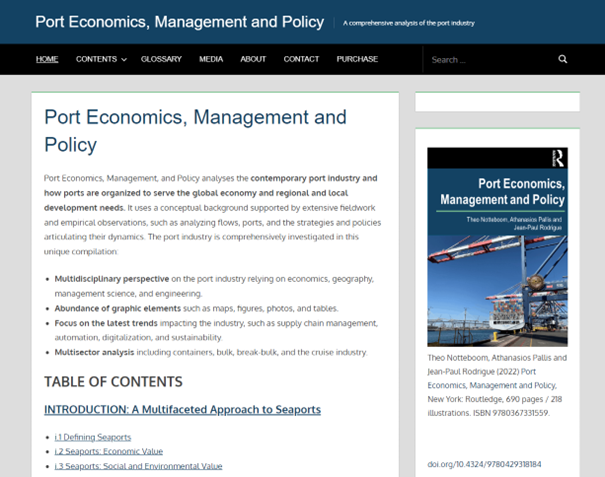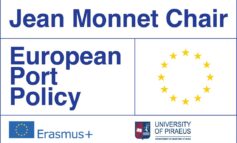PortEconomics members Theo Notteboom (Gent University/University of Antwerp/Antwerp Maritime Academy, Belgium), Athanasios Pallis (University of Piraeus, Greece), and Jean-Paul Rodrigue (Hofstra University, New York, US) – authors of the Port Economics, Management and Policy handbook – partner with Circular Flanders.
Supported by Circular Flanders, the team of leading scholars will examine the potential and the role of ports in circular economy implementation and the impacts of the circular economy on seaport ecosystems. The outcomes will be fully integrated as a new chapter in the hardcopy and the online version of the handbook Port Economics, Management and Policy. The inclusion of the outcomes in this handbook is aimed at assessing the notion of ports and the circular economy in a variety of contexts and for a wide audience ranging from students, practitioners to policymakers.
Not just another workbook
Port Economics, Management and Policy provides a comprehensive analysis of the contemporary port industry, showing how ports are organized to serve the global economy and support regional and local development. This book examines a wide range of seaport topics, covering maritime shipping and international trade, port terminals, port governance, port competition, port policy, and much more. It uses a conceptual background supported by extensive fieldwork and empirical observations, such as analyzing flows, ports, and strategies and policies articulating their dynamics. The port industry is comprehensively investigated in this unique compilation.
Benefitting from the authors’ extensive involvement in shaping the port sector across five continents, students, scholars, and policymakers can also use this as an essential guide towards better port management and governance.
The handbook Port Economics, Management and Policy has become the global leading reference work on all aspects related to seaports, and has been endorsed by leading port specialists from academia, international associations (IAPH, AIVP, FEPORT, ESPO, etc…) and port managing entitities. – Thanos Pallis
Increased attention to circularity and ports
The circular economy presents a paradigm shift for seaports, transforming them into actors more actively involved in sustainability and resource management. By addressing the challenges and seizing the opportunities, seaports can establish themselves as vital contributors to a circular global, regional and local economy, ensuring a more resilient and environmentally responsible future. Governments, businesses, and stakeholders must align to support ports toward sustainability and to reap the advantages of adopting circular economy mechanisms.
While the handbook provides a very comprehensive overview and analysis of all aspects relevant to contemporary port economics, management and policy, we felt there is room to further elaborate on some key issues affecting port ecosystems. One of the themes that need a much more detailed analysis in the book is the circular economy and ports. – Theo Notteboom
At present, ports and governments are paying a great deal of attention to the energy transition, or even parts of it, such as hydrogen (flows, infrastructure). Circular challenges are still somewhat overshadowed, and the interactions between energy and circular transitions are not fully recognized. The transition to a circular economy is not something isolated or an add-on to sustainable development. It is also not just about improving the efficiency of the existing economic system, but a fundamental systemic change or transition to the next economy.
New full-fledged circular economy chapter
The authors will develop an extensive analysis of the theme of (sea)port ecosystems and the circular economy. The potential and the role of ports in circular economy implementation and the impacts of the circular economy on (sea)port ecosystems will be examined. This also includes analyzing the current practices, development trends, challenges, opportunities, and initiatives adopted by seaports worldwide to transition toward a more sustainable and resilient future.
I am glad to participate with Theo and Thanos (long-term collaborators colloquially known as the ‘Charthouse Group’) on this important addition to the textbook. The goal is not just to provide a synthesis of what already exists concerning the role of ports in a circular economy, but also about providing new concepts and ideas, including an actionable framework for ports. – Jean-Paul Rodrigue
The outcomes of the work will be fully integrated as a separate new chapter in the hardcopy and the online version of the handbook Port Economics, Management and Policy. Furthermore, some aspects of the circular economy and ports, like governance and performance, will also be integrated with other parts of the handbook. The inclusion of the outcomes in this freely accessible and widely cited handbook is aimed at assessing the notion of ports and the circular economy in a variety of contexts and for a wide audience ranging from students, practitioners to policymakers.
Partnering between the authors and Circular Flanders is clearly a win-win situation, now and in the years to come. Although the partnership now focuses on the integration of a chapter on circular economy in the handbook, it is far from being a one-off product. With continuity in online updates, it is at the same time a longer-term process that guarantees the deepening and enrichment of the debate at an international level. Such a framework can only help build bridges between the circular economy and port communities. – Walter Tempst (Circular Flanders)
Circular Ports by Circular Flanders
Check out the free accessible online handbook
The book can be used as a textbook in universities and schools. But it can also be used by any active port professional who wants to have a broad basic knowledge of shipping and ports.
The authors also know that a printed book is outdated even before it is on the market, so they also provide permanent updates through an accompanying website.











